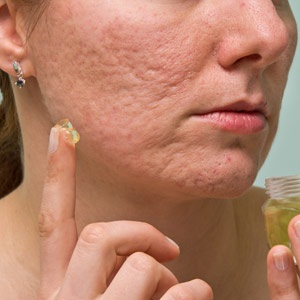
A small study found that the same kind of laser used to remove tattoos improved skin with shorter recovery time than seen with other types of laser.
Acne is the most common skin disease in the United States, according to the US National Institutes of Health, and another type of laser is already used to treat scarring from the condition.
How tattoo laser helps with acne
However, the laser tested in this new study transmits lower energy doses and was used with a special add-on lens. The treatment reduced acne scarring by an average of 25 percent to 50 percent in 20 patients.
"We now have a safe, effective treatment option for acne scars in individuals of all skin types that requires minimal preparation before treatment and results in minimal downtime afterward," said lead researcher Dr. Jeremy Brauer, a dermatologist at Laser & Skin Surgery Center of New York.
Research has shown that acne scarring has negative psychological effects. The scars can ruin the skin's texture and are hard to conceal with makeup, said Dr. Omar Ibrahimi, a dermatologist at Stamford Hospital and Connecticut Skin Institute who specializes in treating scarring.
Read: Depression in acne sufferers
"Acne scarring can have a very negative impact on a person's well-being, and moderate and severe acne can leave its mark in the form of acne scars long after the condition has passed," Ibrahimi said. "Given that acne is a disease of youth, these scars can have a negative impact on a person's functioning in their most formative years. A procedure that has the potential to improve acne scars with only a few hours to a few days of redness and swelling is quite impressive."
Tattoo laser shows skin improvement faster than other types of laser
In the study, 15 women and five men received six treatments with the special laser. The research was partly funded by Cynosure, a company providing aesthetic laser treatments, but Cynosure was not involved in the collection or analysis of data.
Patient follow-ups one and three months after their last treatment revealed a 25 percent to 50 percent visual improvement as assessed by dermatologists. A three-dimensional analysis showed an average 24 percent reduction of the amount of scarring.
The findings were published online Nov. 19 in the journal JAMA Dermatology.
Use of any laser carries risks, but the pain and discomfort levels are low for this treatment, Brauer said.
Is laser treatment painful?
"Most individuals tolerated the treatment without any topical anesthesia and describe sensations ranging from heat to 'pin pricks,' " Brauer said. "At the completion of the treatment, expect to be swollen and pink, like a mild to moderate sunburn," which lasts 24 hours or less, he said.
Only one of the patients needed topical anesthesia, and no cooling anesthesia was used afterward during treatment. On a scale of 1 to 10, the participants rated the pain an average of almost 3 during the first treatment and slightly more than 3 during the last treatment. The pulse rate of the laser increased across the sessions.
Compared to other treatments currently used for acne scarring, such as current lasers, chemical peels and surgical removal of skin, this laser treatment causes less pain, redness and swelling, and has a faster recovery time, Brauer said.
The tradeoff for that, however, is that it may not be as effective as the current preferred method, called fractional laser technology, said Ibrahimi.
"I still maintain that fractionated laser technology is the undisputed gold standard in treating acne scars," Ibrahimi said, though its drawbacks include more discomfort and a downtime of a few days to a week. "This study introduces an interesting and potentially useful alternative, [but] I think 'treatment for treatment' that fractionated laser technology will be superior to [the new] technology in terms of efficacy."
Ibrahimi also offers a treatment called "fractional radiofrequency," which uses a different kind of energy than lasers and has produced good results, but he noted it also requires more study.
Individuals with any skin type could effectively receive the treatment, but "those with 'ice pick' scarring - lesions that are very narrow and deep - do not stand to benefit to the degree that those with 'rolling' or 'boxcar' scars should," Brauer said.
He said the cost of the procedure would range between $400 and $1 000 (around R5000 - R11 000) for the typical person.
This was a pilot study without a follow-up study planned, but Brauer said other research is ongoing to test the use of this laser with scarring in general.
Read more:Can acne be prevented?
Can acne be cleared overnight?




 Publications
Publications
 Partners
Partners











